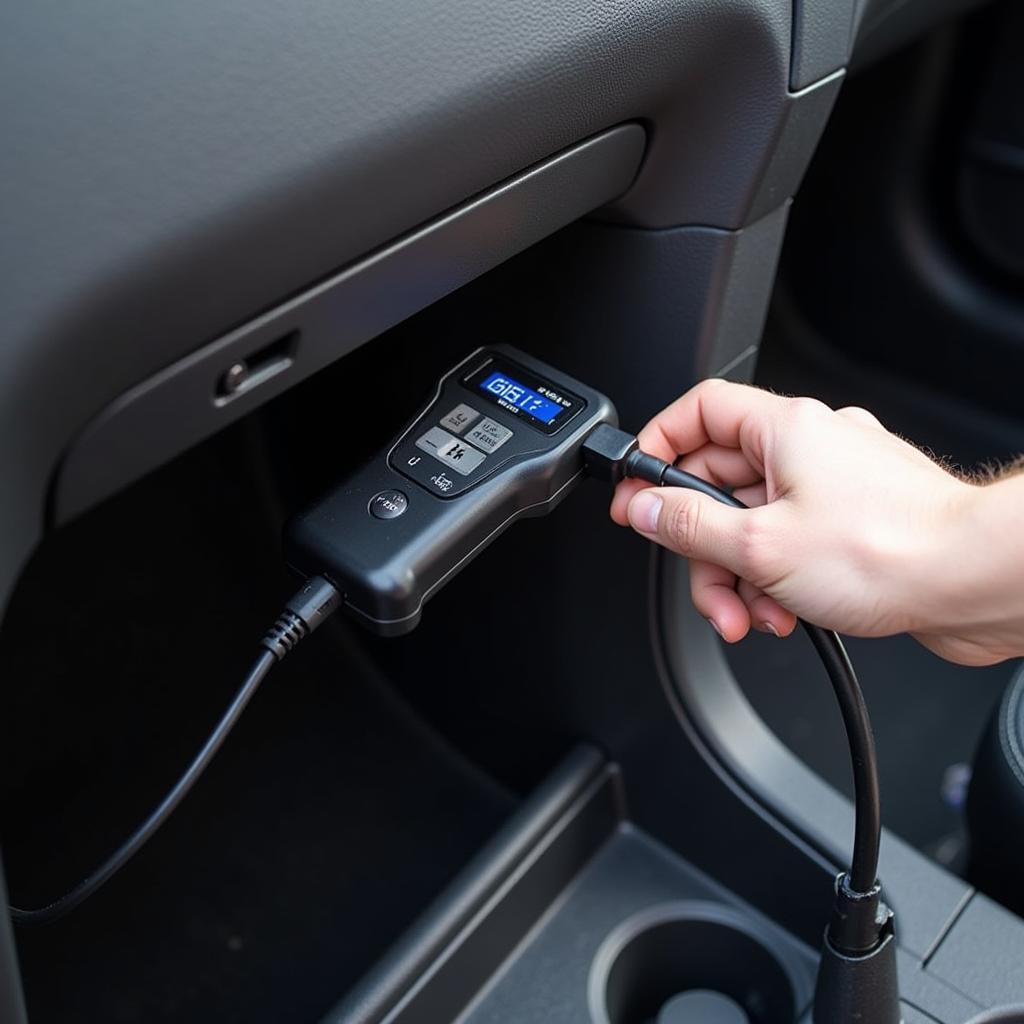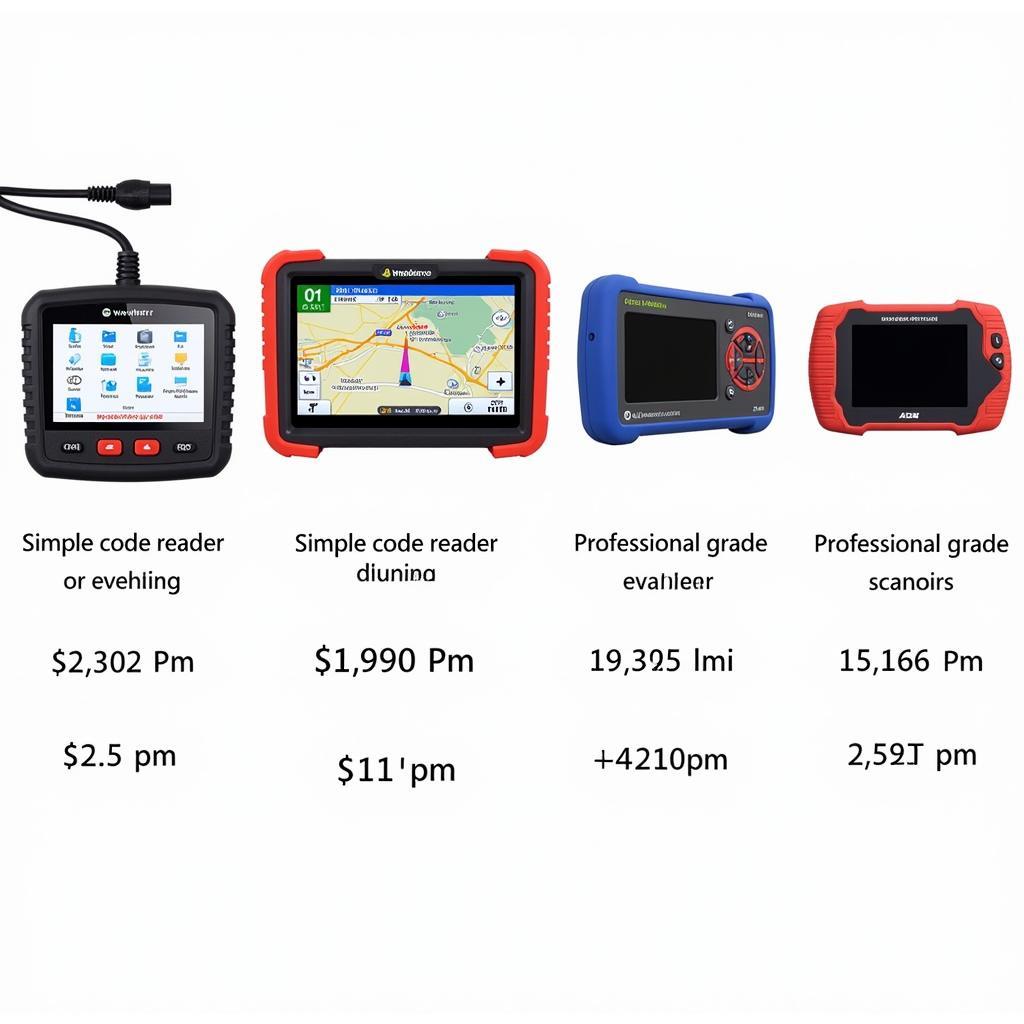In today’s tech-driven world, even our cars are becoming increasingly sophisticated. Gone are the days of relying solely on a mechanic’s intuition to diagnose car problems. Plug-in car diagnostic tools have emerged as essential equipment for both car enthusiasts and professional mechanics, offering a window into the inner workings of modern vehicles.
What is a Plug-in Car Diagnostic Tool?
A plug-in car diagnostic tool, also known as an OBD2 scanner, is a device that connects to your car’s onboard computer system through the OBD2 port. This port, typically located under the dashboard on the driver’s side, acts as a data gateway, allowing the tool to access a wealth of information about your vehicle’s health and performance.
 Car Diagnostic Tool Connected to OBD2 Port
Car Diagnostic Tool Connected to OBD2 Port
How Does a Plug-in Diagnostic Tool Work?
Once connected, the tool communicates with your car’s computer, retrieving and deciphering diagnostic trouble codes (DTCs). These codes, often represented by a combination of letters and numbers, correspond to specific issues or malfunctions detected by your car’s sensors.
Think of it like this: your car is constantly monitoring itself, and if something seems off, it logs a DTC. The plug-in car diagnostic tool acts as a translator, converting these codes into understandable language for you to interpret.
Why is a Plug-in Car Diagnostic Tool Important?
For car owners, a plug-in diagnostic tool provides a level of transparency and control over their vehicle’s maintenance. Instead of facing a cryptic “check engine” light and a trip to the mechanic filled with uncertainty, you can now pinpoint the problem area yourself.
This empowers you to:
- Identify the severity of the issue: Is it a minor sensor malfunction or a more serious engine problem?
- Research solutions and costs: Armed with the specific DTC, you can explore repair options and get a better understanding of potential expenses.
- Communicate effectively with mechanics: Provide your mechanic with accurate information, saving time and potentially avoiding unnecessary repairs.
- Monitor your car’s health: Regularly scanning for DTCs allows you to stay ahead of potential problems and address minor issues before they escalate.
 Mechanic Using a Professional Diagnostic Machine for Cars
Mechanic Using a Professional Diagnostic Machine for Cars
For those who enjoy working on their own vehicles, a plug-in diagnostic tool is an indispensable asset. It allows you to diagnose and troubleshoot problems independently, making DIY repairs more accessible and less daunting.
Types of Plug-in Car Diagnostic Tools
The market offers a wide array of plug-in car diagnostic tools, catering to various needs and budgets.
- Basic Code Readers: As the name suggests, these entry-level devices primarily focus on reading and clearing DTCs. They are a budget-friendly option for car owners seeking basic diagnostic capabilities.
- Advanced Scan Tools: Offering a step up in functionality, these tools delve deeper into your car’s systems, providing live data streams, sensor readings, and even the ability to perform certain functions like resetting the oil light or recalibrating sensors.
- Professional-Grade Scanners: Utilized by mechanics and automotive professionals, these high-end tools provide comprehensive diagnostic capabilities, including advanced programming functions, bi-directional control, and access to manufacturer-specific data.
 Different Types of Plug-in Car Diagnostic Tools
Different Types of Plug-in Car Diagnostic Tools
Choosing the Right Plug-in Car Diagnostic Tool
Selecting the right tool depends on your individual requirements and technical expertise.
- Frequency of use: If you only plan to use the tool occasionally, a basic code reader might suffice. However, if you’re a DIY enthusiast or a professional, investing in a more advanced tool is recommended.
- Vehicle compatibility: Ensure the tool you choose is compatible with your car’s make, model, and year.
- Features and functionality: Consider what features are important to you, such as live data streaming, graphing capabilities, or the ability to perform specific functions.
- Budget: Prices for plug-in car diagnostic tools can range significantly, so determine your budget and choose a tool that offers the best value for your needs.
Taking Control of Your Car’s Health
Plug-in car diagnostic tools have revolutionized the way we interact with and understand our vehicles. They empower car owners with knowledge, allowing them to take a proactive approach to car maintenance, make informed decisions, and potentially save on costly repairs. Whether you’re a car enthusiast or simply want more control over your vehicle’s well-being, investing in a plug-in car diagnostic tool is a wise decision in today’s technologically advanced automotive landscape.
FAQs about Plug-in Car Diagnostic Tools
1. Will a plug-in car diagnostic tool work on any car?
While most modern vehicles (1996 and newer) are equipped with the OBD2 port, compatibility can vary. It’s essential to check the tool’s specifications and ensure it supports your car’s make, model, and year.
2. Can I use a plug-in car diagnostic tool to fix my car myself?
While these tools can help you identify problems, they don’t inherently fix them. They provide valuable information to guide repairs, but you’ll need mechanical knowledge and the appropriate tools to address the issues.
3. Are plug-in car diagnostic tools difficult to use?
Most plug-in car diagnostic tools are designed with user-friendliness in mind. They often come with intuitive interfaces and clear instructions, making them accessible even for those with limited technical experience.
4. Do I need to be a mechanic to benefit from a plug-in car diagnostic tool?
Absolutely not! Car owners of all technical levels can benefit from these tools. Even a basic understanding of the information they provide can empower you to make more informed decisions about your car’s maintenance.
5. Can I use a plug-in car diagnostic tool to reset the check engine light?
Yes, most tools offer the ability to clear DTCs, which will typically reset the check engine light. However, keep in mind that simply clearing the code doesn’t address the underlying issue.
6. How often should I use a plug-in car diagnostic tool?
It’s a good practice to scan your car for DTCs periodically, even if you haven’t noticed any issues. This allows you to stay ahead of potential problems and address them before they escalate.
7. Are there any risks associated with using a plug-in car diagnostic tool?
When used correctly, these tools are generally safe. However, it’s important to only use reputable tools and avoid tampering with settings or functions you’re not familiar with.
Explore More About Car Diagnostics
If you’re interested in learning more about car diagnostics and how they can benefit you, we encourage you to explore our website for additional resources:
Need Expert Assistance?
For personalized guidance and support regarding car diagnostics, feel free to reach out to our team of experts:
WhatsApp: +1(641)206-8880
Email: [email protected]
We’re available 24/7 to assist you with all your car diagnostic needs.

Leave a Reply